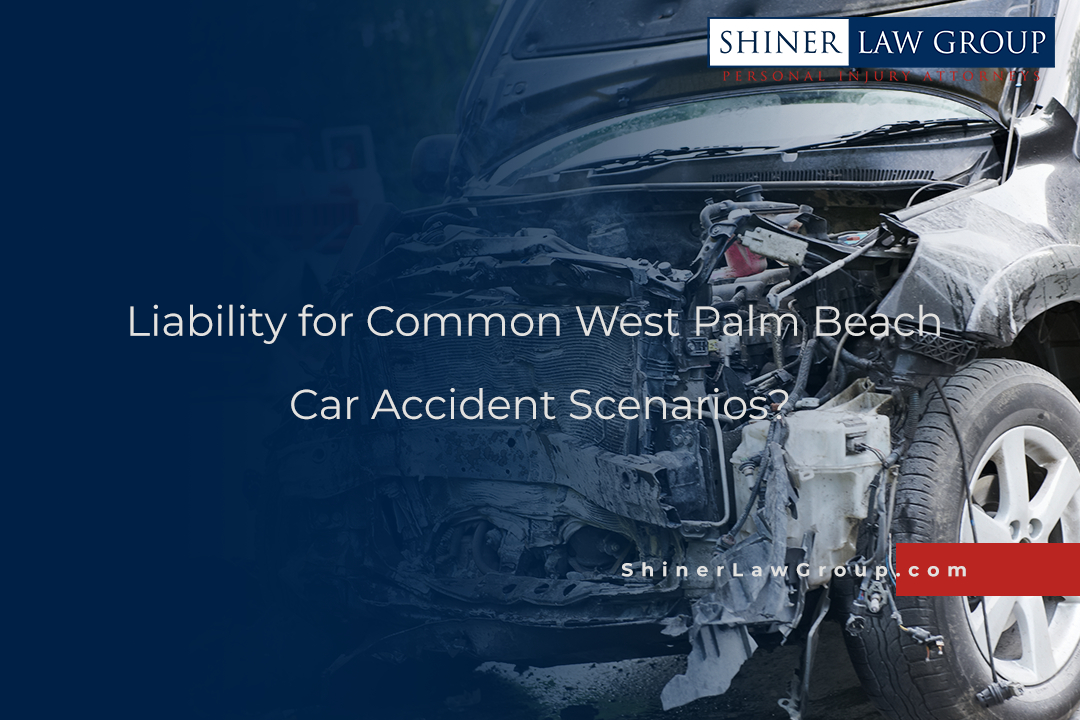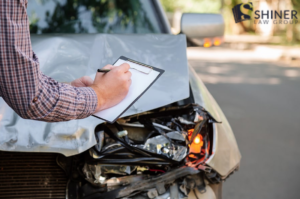Car accidents can happen anywhere on the roads of West Palm Beach, and at any time of day. In the aftermath of an accident, determining liability can quickly rise to the top of your priority list. The liable driver’s insurance company must take responsibility for vehicle repairs and, in many cases, pay for medical expenses for victims injured by the driver’s negligence.
Below, we discuss some of the most common types of car accident scenarios that we come across in West Palm Beach. Depending on the circumstances of your accident, establishing liability may prove complicated, in which case you should consult an experienced attorney to help guide you.
Scenario #1: A distracted driver, checking his GPS, drifts into another lane of traffic.
West Palm Beach sees a heavy amount of tourist traffic each year, and those tourists may have trouble finding the locations they need to reach without help from a GPS or map. Florida law does not allow drivers to hold handheld communication devices in school and work zones.
The law does not prohibit the use of other handheld devices, including GPS devices. However, using any handheld device, like a GPS, can pose a potent distraction for many drivers. Programming a GPS involves two distractions: both manual and visual. It may also involve a cognitive distraction, since the driver may need to concentrate on the directions provided by the GPS or on trying to program it.
While the law does not prohibit using a GPS or, indeed, many of the other actions West Palm Beach residents may want to take behind the wheel, drivers who choose to drive while distracted do bear liability for any actions that they take. If a distracted driver causes an accident due to that distraction, the distracted driver may bear liability for the accident, and that driver’s insurance policy may need to cover those damages.

Scenario #2: One driver T-bones another in the middle of an intersection.
A T-bone accident can involve serious injuries, particularly to passengers on the side of the vehicle that takes the direct impact of the other car. Often, T-bone collisions result in serious broken bones and back and neck injuries. Which party bears liability for the accident may depend on several important factors, including:
Who had the right of way at the time of the accident?
Often, one driver clearly has the right of way. For example, some intersections in West Palm Beach allow one lane of traffic to move steadily through the intersection, while the other lane of traffic has to stop. In other cases, it can prove more difficult to determine who has right of way: for example, right of way might rely on traffic signals at the time of the accident. If one driver had a green light, and the other had a red light, the driver with the green light had the right of way, and the driver that ran the red light might bear liability for the accident.
Was one vehicle already in the intersection?
Sometimes, regardless of who had the right of way, one vehicle might enter the intersection. The vehicle might have stalled in the middle of the intersection, or the driver might have entered the intersection before the other vehicle approached the intersection. If one vehicle clearly already entered the intersection, that vehicle has the right of way, and the other driver may bear liability for the accident.
Scenario #3: A drunk driver hits a pedestrian in a crosswalk.
West Palm Beach has a buzzing nightlife, including numerous opportunities for visitors to visit bars or restaurants where they might choose to consume alcohol. Often, vacationing visitors, in particular, may choose to overindulge, but ultimately get behind the wheel anyway. West Palm Beach residents may also, in some cases, choose to drink and drive.
If a driver hits a pedestrian, the driver frequently bears liability for the accident, especially if the pedestrian has legally entered the crosswalk. Drunk drivers also frequently bear liability for any accident caused by their negligence, including the negligent decision to get behind the wheel after drinking.
Florida’s dram shop laws do not, in most cases, leave the bar or restaurant that served the drunk driver that caused an accident liable for the injuries that drunk driver caused. Florida law only leaves the bar or restaurant liable for the negligent decisions of a drunk driver if the bar or restaurant knowingly serves an underage drinker or someone with known alcohol addiction. However, in a drunk driving accident, the liable driver may end up paying punitive damages in addition to the usual damages in a personal injury claim.
Scenario #4: A rear-end collision.
In a rear-end collision, the driver who hits the other from the rear almost always bears liability for the accident.
A rear-end collision may result from a variety of circumstances, including:
- Failing to stop at an intersection, including red lights and stop signs
- Following too closely behind another driver
- A sudden stop or reduction in speed
Sometimes, rear-end collisions may result from general driver distraction, from looking down at a cell phone to attempting to program a GPS device. Other times, rear-end collisions may result from aggressive driving behavior, including road rage. Vacationing drivers may prove more prone to road rage or other aggressive driving acts, which may increase the risk of rear-end collisions throughout the West Palm Beach area.
Scenario #5: A commercial driver causes a serious accident.
West Palm Beach sees the same amount of truck traffic that you will find throughout much of the rest of Florida and the United States as a whole. Big trucks help deliver the goods that West Palm Beach residents rely on, including truckloads of goods destined for souvenir shops and other popular chains in the area. Those big trucks serve a vital purpose, but they may also raise the risk of serious accidents, particularly since big trucks weigh more and may cause more damage than the average passenger vehicle.
If a commercial driver causes a serious accident, determining who bears liability for the accident could require a more complex investigation than an investigation into a normal collision between two passenger vehicles.
The Driver
In most big truck accidents, if the driver’s negligence resulted in the accident, the driver bears primarily liability. Big truck drivers often carry substantially larger insurance policies than the average passenger vehicle driver, which means that victims injured in a big truck collision may have grounds to seek more compensation than they would after an accident with a passenger vehicle.
The Driver’s Company
In many cases, the company that employs a commercial driver will share liability for an accident caused by that driver. Sometimes, the company may contribute to the accident in some way. The company bears a high duty of care to its drivers and to others who must share the road with those drivers, and failure to adhere to that duty of care can substantially increase the risk that the driver will cause an accident.
The trucking company may share liability for an accident if:
- The company pushes its drivers to exceed the federally restricted number of hours truck drivers can spend behind the wheel each day.
- The company pushes its drivers to break the law, including traveling at excessive speeds or ignoring the rules of the road in an effort to complete deliveries faster.
- The company requires its drivers to continue driving in unsafe circumstances, including while inebriated or ill.
- The company fails to take care of necessary maintenance on a company-owned truck, resulting in a mechanical failure that causes a serious accident.
The Company That Loaded the Truck
Did a shifting load cause a serious truck accident in West Palm Beach? Often, shifting load accidents result from improper loading practices. On a flatbed, a shifting load accident could mean that the load topples off of the truck, resulting in severe injury to the passengers of the vehicles around it. A shifting load in a cab, however, could pose an equal danger. Shifting loads could cause jackknife accidents or increase the risk of a rollover accident, especially on tight, winding roads or in poor weather conditions.

Scenario #6: A delivery driver caused a serious accident due to negligent behavior.
Many West Palm Beach residents and visitors rely on food delivery to help get them through busy evenings. Vacationers might choose to bring pizza delivery directly to their rental properties or hotel rooms, especially on days with bad weather that do not prove ideal for other vacation activities. Residents, on the other hand, often rely on their favorite food delivery services to help get them through busy nights or hard evenings.
If a delivery driver causes an accident, who bears liability? Most often, the delivery driver will bear liability for a direct act of negligence that results in a serious car accident. Most delivery drivers need to carry specific riders on their car insurance policies to cover using the vehicle for commercial purposes.
In some cases, however, the company that employs the delivery driver may share liability for the accident.
This may include situations like:
- The company failed to adequately check the driver’s background and hired a driver with a history of causing accidents.
- The company pushed the driver to work despite dangerous conditions, including illness, inebriation, or exhaustion.
- The company pushed the driver to work during poor weather conditions that substantially increased the risk of an accident.
Consult a West Palm Beach car accident attorney as soon after the accident as possible to get a better idea of who may bear liability for a specific collision, especially if it involved a delivery driver or worker on the clock at the time of the incident.
Scenario #7: One driver hit another vehicle head-on.
A head-on collision can cause significant damage to both vehicles and severe injury to everyone inside them, since head-on collisions combine the speed of both vehicles to create a greater level of force. Head-on collisions constitute some of the most deadly car accidents that occur in West Palm Beach. To determine liability in a head-on collision, police officers and attorneys will look at several key factors.
Who shifted out of his assigned lane?
Generally, in a head-on collision, the police will look at which driver moved out of his assigned lane and into the other. The liable driver might include one who drove the wrong way down a one-way street or one who, due to inebriation, chose to travel in the wrong lane. The liable driver might also have drifted out of his assigned lane due to distraction.
At what speed did the two drivers travel?
Sometimes, speed can prove a substantial contributing factor in a head-on collision. If both drivers speed, it may result in more severe injury to the occupants of both vehicles, and both drivers may, in some cases, share liability for the accident. Speeding involves more than just driving above the posted speed limit; it can also include driving too fast for road conditions, whether that includes rain, snow, wind, traffic, or a combination of multiple factors.

Car Accident Attorney, David Shiner
West Palm Beach sees a great deal of tourist traffic in addition to regular traffic from residents every day. Car accidents can ruin your vacation or your whole future in the blink of an eye. An attorney can help you determine who bears liability for the accident and what compensation you should expect.
Contact a West Palm Beach car accident attorney to schedule a free consultation, during which you can discuss the details of your accident, ask questions about your legal options, and determine your eligibility to pursue compensation for the full cost of your injuries.